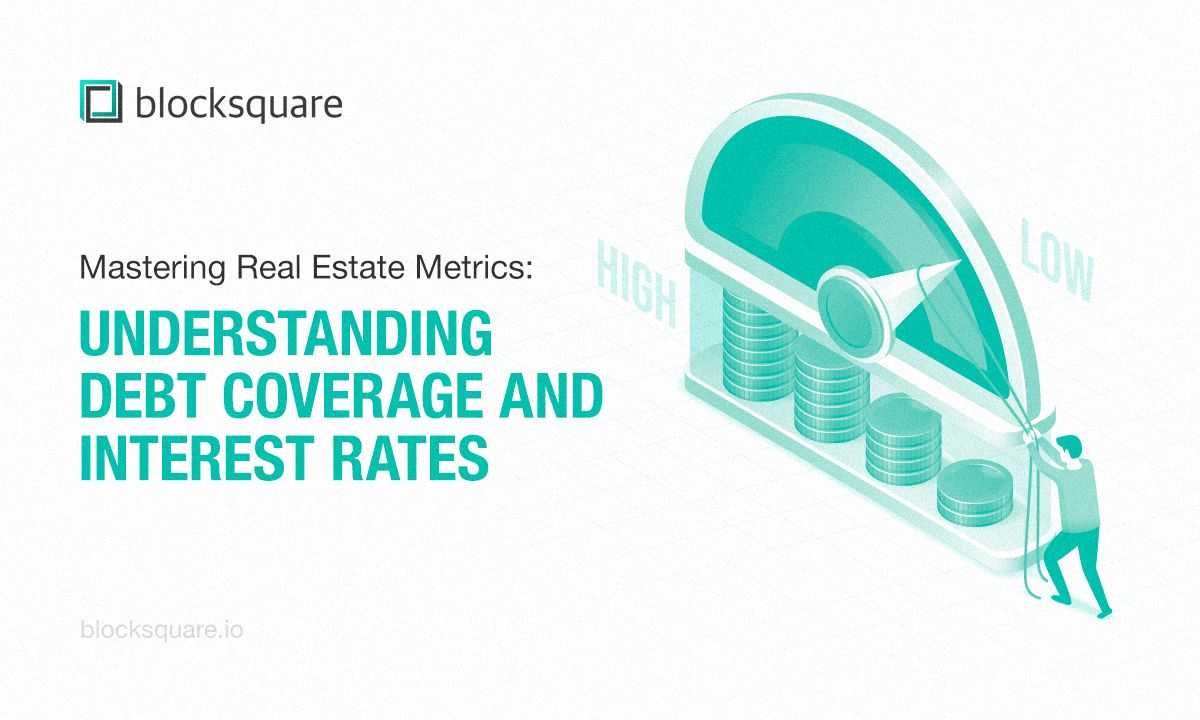Mastering Real Estate Metrics: Understanding Debt Coverage and Interest Rates
Real estate investment is a complex journey, with multiple variables to consider and countless risks to assess. One crucial aspect of this process involves understanding and optimizing key financial metrics to make informed investment decisions.


In this article, we'll delve into two fundamental metrics: Debt Coverage Ratio and Interest Rates, as explained by Blocksquare's Head of Risk, Daniel Kaines and real estate expert Makram Hani in the latest Block-chat #71.
Debt Coverage Ratio (DCR) Explained:
The Debt Coverage Ratio (DCR) is a financial metric that plays a pivotal role in evaluating the financial health of a real estate investment. It is a crucial indicator for investors as it gauges a property's ability to generate enough income to cover its debt obligations. DCR is essential for assessing solvency and is calculated by dividing the property's net operating income (NOI) by its debt service. ** The DCR formula is expressed as follows:** DCR = Net Operating Income (NOI) / Debt Service
According to Daniel, for an investment to remain solvent, the DCR must stay above one. If the DCR is below one, it indicates that the property's debt costs exceed its income, making it a risky investment. Therefore, investors should aim to maintain a DCR above one to ensure financial stability.
Interest Rates and Their Impact on Real Estate:
Interest rates have a significant impact on real estate investments. When considering real estate investments, it is essential to examine how interest rates might affect the property's financial performance. Low interest rates can be a boon for property owners, allowing them to finance their investments at favorable terms. However, as interest rates rise, property owners may face increased debt costs, potentially affecting their cash flow and overall profitability.
Understanding Debt Coverage Ratio's Role:
When evaluating real estate investments, it is essential to take a closer look at the Debt Coverage Ratio in the context of interest rates. By calculating the DCR under different interest rate scenarios, investors can assess their property's financial resilience and make informed decisions about their investments.
For example, if you're an individual property owner with an upcoming mortgage refix, you can calculate your DCR at different interest rates to ensure that you will remain financially stable in the future. This helps you identify any potential risks and take appropriate action.
Maintenance Expense Ratio:
Another critical metric to consider is the Maintenance Expense Ratio, which falls under the category of depreciation risk. This ratio represents the percentage of a property's revenue allocated to cover maintenance expenses. A lower percentage is preferable, as it indicates efficient maintenance management and lower costs.
Lease Maturity Profile:
The Lease Maturity Profile is a key metric that provides insight into the remaining duration of a property's leases. This information is essential for assessing the financial performance and potential risks associated with a property. It allows investors to understand when cash flow may be interrupted due to lease expirations and how to plan for any necessary property upgrades or re-tenanting.
"Recognizing where you stand in the debt and interest rate cycle is crucial when gauging the effect on your property's financial health. Being prepared for potential changes in the financial landscape is essential." Makram Hani, COO Blocksquare
Mastering real estate metrics, such as Debt Coverage Ratio and interest rates, is crucial for making sound investment decisions. These metrics offer insight into a property's financial health, solvency, and overall stability. By using these metrics alongside other data and analysis tools, investors can mitigate risks and optimize their real estate investments.
As the real estate market continues to evolve and interest rates fluctuate, keeping a close eye on these metrics becomes increasingly important. Expert insights from professionals like Daniel can provide valuable guidance and help investors navigate the intricate world of real estate with confidence.